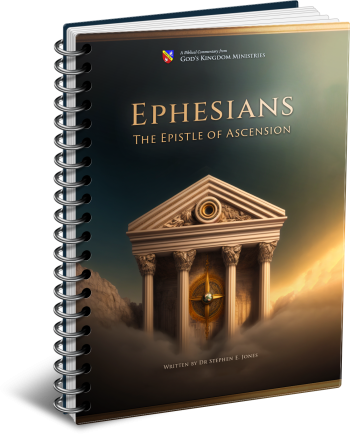Latest Posts
View the latest posts in an easy-to-read list format, with filtering options.

Paul's epistle to the Ephesians is, in some ways, a continuation of his epistle to the Romans. It enlarges upon Romans 1-8 in regard to the believer's position and right standing with God. We are "seated" with Christ, so we must "walk" according to our calling, and "stand" in the full armor of God against those who would oppose us.
Category - Bible Commentaries

In addition to the spiritual armor given to the saints (Eph. 6:14-17), we should take note that God Himself has other weapons of war besides the sword of the Spirit. One of God’s main weapons is His bow. Psalm 7:12 says,
12 If a man does not repent, He will sharpen His sword; He has bent His bow and made it ready.
What is God’s bow? Zech. 9:13 says, “For I will bend Judah as My bow; I will fill the bow with Ephraim.” In other words, Ephraim is pictured as God’s arrow that fills the bow of Judah. Judah means “praise.” Hence, praise is God’s bow. But the arrow being shot by Judah is Ephraim, “the double portion of fruit.” Ephraim received the birthright of his father, Joseph. The birthright has to do with the sons of God.
Hence, God’s arrows are the sons of God, His “children.” Psalm 127:3-5, says,
3 Behold, children are a gift of the Lord, the fruit of the womb is a reward. 4 Like arrows in the hand of a warrior, so are the children of one’s youth. 5 How blessed is the man whose quiver is full of them…
God’s arrows are also pictured as lightning bolts (Psalm 18:14; Psalm 77:17; Psalm 144:6), accompanied by thunder—God’s voice. The Hebrew metaphor tells us that the sons of God are His arrows sent by His bow to praise God by speaking His word.
This is a formidable weapon in God’s arsenal. He sends out His sons as ambassadors with the word of reconciliation to cause men to repent. “If a man does not repent,” the psalmist says, God bends his bow, getting ready to send forth His “arrows” with a word that causes men to repent.
The nature of that word is pictured in the rainbow in the time of Noah. Gen. 9:13 says,
13 I set My bow [qeset] in the cloud, and it shall be for a sign of a covenant between Me and the earth.
The word translated “bow” is the same word used to describe the “bow” that is God’s weapon of war.
This weapon, then, is clearly God’s main New Covenant weapon, because the bow in Noah’s day signified the New Covenant promise of God to save the entire earth (Gen. 9:16). This is the word shot forth as an arrow. It is the message of reconciliation of which God’s ambassadors are ministers.
Even as the sharp sword coming from Christ’s mouth is not meant to destroy but to save the nations, so also can the same be said of God’s bow and arrow. God’s bow is also linked to Job’s “glory” in Job 29:20,
20 My glory is ever new with me, and my bow is renewed in my hand.
In the case of God’s bow, we read in Ezekiel 1:28,
28 As the appearance of the rainbow in the clouds on a rainy day, so was the appearance of the surrounding radiance. Such was the appearance of the likeness of the glory of the Lord…
Hence, the glory of God is His New Covenant promise, which will always bring glory to His name, simply because He is able to fulfill His promise to reconcile the world to Himself. When God looks at the rainbow, He remembers His covenant promise (Gen. 9:16).
This Hebrew expression signifies that He has not forgotten and will surely fulfill it. When we, as believers, are confident that God can and will perform all that He has promised, then we have Abrahamic faith, which imputes righteousness to us.
Paul’s list of spiritual armor ends with the sword of the Spirit, and then he instructs the believers to pray. Eph. 6:18-20 says,
18 With all prayer and petition pray at all times in the Spirit, and with this in view, be on the alert with all perseverance and petition for all the saints, 19 and pray on my behalf, that utterance may be given to me in the opening of my mouth, to make known with boldness the mystery of the gospel, 20 for which I am an ambassador in chains; that in proclaiming it I may speak boldly, as I ought to speak.
Paul seems to connect the sword of the Spirit with praying in the Spirit. In all things we are to be led by the Holy Spirit working through our own human spirit, for His presence has come upon us even as it did with the tabernacle of Moses and the temple of Solomon. We are temples of God (1 Cor. 3:16), and all prayer ought to reflect the will of God—or, if one does not know His will, then one should seek the will of God in order to know how to pray.
The “natural man” (1 Cor. 2:14), that is, the soulish man, speaks from the soul, “but he who is spiritual,” (the new creation man residing in one’s spirit) speaks the word of God (the sword of the Spirit). Both “men” use the mouth to speak, but only the spiritual man has words of life that characterize the sharp sword.
Prayer for the saints is one manifestation of this spiritual sword, for the sword is not limited to warfare as such but includes other reasons for prayer. Yet Paul requested prayer while he was a prisoner awaiting trial, so he was, at least in part, asking the saints to use the sword of the Spirit to defend him. He also wanted them to use this sword as an offensive weapon, “that utterance may be given to me in the opening of my mouth, to make known with boldness the mystery of the gospel.”
In other words, Paul wanted to speak the word of God with boldness, so that Nero, the Roman Emperor, would understand clearly the great secret of the gospel. That secret (“mystery”), as we showed earlier, is the plan of God to save the whole world, Jew and Gentile alike. Recall that this mystery of Christ was defined in Eph. 3:4-6, “that the Gentiles are fellow heirs and fellow members of the body, and fellow partakers of the promise.”
Paul was “an ambassador in chains,” a messenger sent (in this case) to Nero himself, letting him know that he too could be part of the body of Christ by faith. The Romans, in those days, despised Judaism for its exclusive nature and for its fleshly circumcision. Judea was their most unruly and rebellious province, because the people refused to assimilate or to adopt the culture of Rome. Rome’s apostles attempted to bring Roman culture and “civilization” to all the countries and colonies that were under their authority, but Judea was their biggest problem. Jesus’ apostles were sent to bring the culture of the heavenly Kingdom to the world.
When Paul was taken to Rome, he knew that Nero would assume that Paul was just another Jew and that Christianity was just another sect of Judaism. Paul’s argument was that Christianity was distinct from Judaism and had a different gospel. The mystery of Christ, not known in Judaism, was that the body of Christ included Jews and Gentiles alike and that they were equal in the sight of God.
We know from history that Paul was acquitted, but Nero did not become a believer.
Paul asked the saints in Ephesus to pray for him so that he would speak boldly the message which the Holy Spirit had given him as an ambassador. Paul’s claim as an ambassador means that he had been given “the word of reconciliation” (2 Cor. 5:19). This word proclaimed not only that God was reconciling the world to Himself, but also that all ethnic groups were being reconciled into one body (Eph. 2:13-15).
Eph. 6:21, 22 says,
21 “But that you also may know about my circumstances, how I am doing, Tychicus, the beloved brother and faithful minister in the Lord, will make everything known to you. 22 I have sent him to you for this very purpose, so that you may know about us, and that he may comfort your hearts.
Paul sent his letter with Tychicus, the “beloved brother and faithful servant” (Col. 4:7) who was assisting him in Rome during his house arrest (Acts 28:30). Paul knew that the church in Ephesus (and the other churches) would be concerned for his welfare, so he wanted them to know how he was doing. The fact that Tychicus would “comfort your hearts” tells us that Paul was not suffering. He was only being restricted.
As for Paul’s personal “circumstances,” according to church history, Paul was actually living with Rufus Pudens and his British wife, Gladys, at a place known as the Palatium Britannicum (Palace of the Britons). The Emperor Claudius, in 52 A.D., was impressed with Gladys and gave her the name Claudia—named after himself. Roman poets speak of her often. Paul greets Rufus in Rom. 16:13 and “Pudens and Linus and Claudia” in 2 Tim. 4:21. (Linus, the first bishop of Rome, was Claudia’s brother.)
See the Forward in Paul’s Epistle to the Saints in Rome, Book 1, and chapter 17 of Book 2.
Paul closes his epistle by writing in Eph. 6:23, 24,
23 Peace be to the brethren, and love with faith, from God the Father and the Lord Jesus Christ. 24 Grace be with all those who love our Lord Jesus Christ with incorruptible love.
Here Paul crams many important concepts into a short space: Peace, Love, Faith, and Grace. All of these have already been discussed at length in our comments on earlier passages. This ends Paul’s epistle to the church in Ephesus.